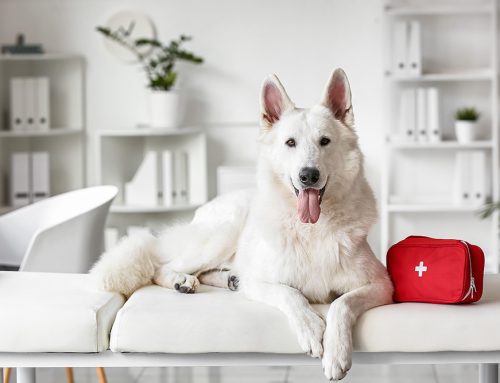Have you ever wondered why your dog seems to think that barking is their full-time job? You’re not alone. At Central Kentucky Veterinary Center, dog owners often ask us for help in decoding their furry friend’s vocal habits. Constant barking can be puzzling and upsetting, but understanding can bring much-needed relief. Our team can help your dog learn to communicate more quietly and effectively.
1. The social butterfly dog: Barking to communicate
Dogs, much like people, bark to chat. They may be saying “Hello” to the mailman, warning you of a squirrel invasion, or simply letting out their inner socialite. Imagine your dog as the neighborhood watch leader, always on the lookout, always vocal.
Helpful tips:
- Training — Teach commands like “Quiet” or “Enough” to help control the chatter.
- Socialization — Introduce your dog to a variety of people and animals to reduce excitement barking.
Use white noise — Keep your dog calm by turning on the TV or playing calming music to mask outside noises that trigger the barking.
2. Dogs just want to have fun: Boredom barking
If your dog is left alone with nothing but their thoughts and a lackluster chew toy, they’re likely to start barking out of boredom. It’s their way of saying, “Hey, can someone play with me?”
Helpful tips:
- Provide enrichment — Provide interactive toys and puzzles that challenge your dog mentally.
- Exercise regularly — Ensure your dog gets plenty of physical activity to burn off excess energy so they want to rest.
- Rotate toys — Stimulate your dog by regularly swapping out their toys, which will keep their interest and prevent boredom.
3. Demanding dogs: Barking for attention
Sometimes, dogs bark because they’ve learned that their barking gets your attention and you are taking notice of them. They see a simple “Be quiet!” as rewarding, because you’re engaging with them.
Helpful tips:
- Positive reinforcement — Reward your dog when they are quiet and calm.
- Ignore attention-seeking barking — Avoid reinforcing the behavior by not responding immediately.
- Scheduled play — Establish set times for play and interaction to reduce your dog’s need to seek attention through barking. Dogs thrive on a routine and knowing what to expect may reduce their need to bark.
4. The nervous Nellie: Dogs with anxiety
Separation anxiety or fear can turn your dog into a barking machine. They may start barking only when you leave the house, although some dogs will bark the whole time they are alone. They may also bark when they are fearful, such as during a fireworks show or a thunderstorm. Think of their barking as their loud version of a stress relief ball.
Helpful tips:
- Desensitization — Gradually get your dog used to the situations that cause anxiety.
- Comfort items — Items with your smell may be soothing when you’re away.
- Calming aids — Consider pheromone diffusers, calming collars, or anxiety wraps to help calm your dog during stressful situations.
5. Dogs on patrol: The territory protector
Your dog’s instincts to protect their home and their family can trigger barking at any potential threat. From the mailman to a passing dog, your furry protector is always on high alert.
Helpful tips:
- Block views — Close curtains or use opaque film on windows to limit visual triggers.
- Redirect attention — When your dog perceives a threat, redirect their attention and command an alternative behavior, like fetching a toy.
- Controlled exposure — Allowing your dog to become familiar with visitors or other dogs in a controlled setting can help reduce territorial barking.
6. Playful pets: Barking during play
Barking during playtime can be an expression of joy and excitement. If your dog barks while they chase a ball or wrestle with a toy, they are telling you that they are having fun.
Helpful tips:
- Structured play — Incorporate training into playtime to help manage excitement levels.
- Set boundaries — Teach your dog to play quietly indoors and let them express themselves vocally outside—so long as that won’t annoy your neighbors.
- Use quiet play — Engage in more peaceful forms of play, such as nose work games or hide-and-seek, to reduce the chances of excitement barking.
When to get help for your pet’s persistent barking

If your dog’s excessive barking does not stop or is negatively impacting your daily life, you should seek professional help. Persistent barking can sometimes indicate deeper issues, such as health problems or severe anxiety.
Understanding why your dog barks is a large part of the solution, but you likely will need veterinary help. At Central Kentucky Veterinary Center, we want to assist by diagnosing and addressing the root causes of your dog’s constant barking.
Schedule a consultation with our experienced team for a personalized solution for managing your dog’s persistent barking. Let’s keep the peace and the barks at bay.







Leave A Comment